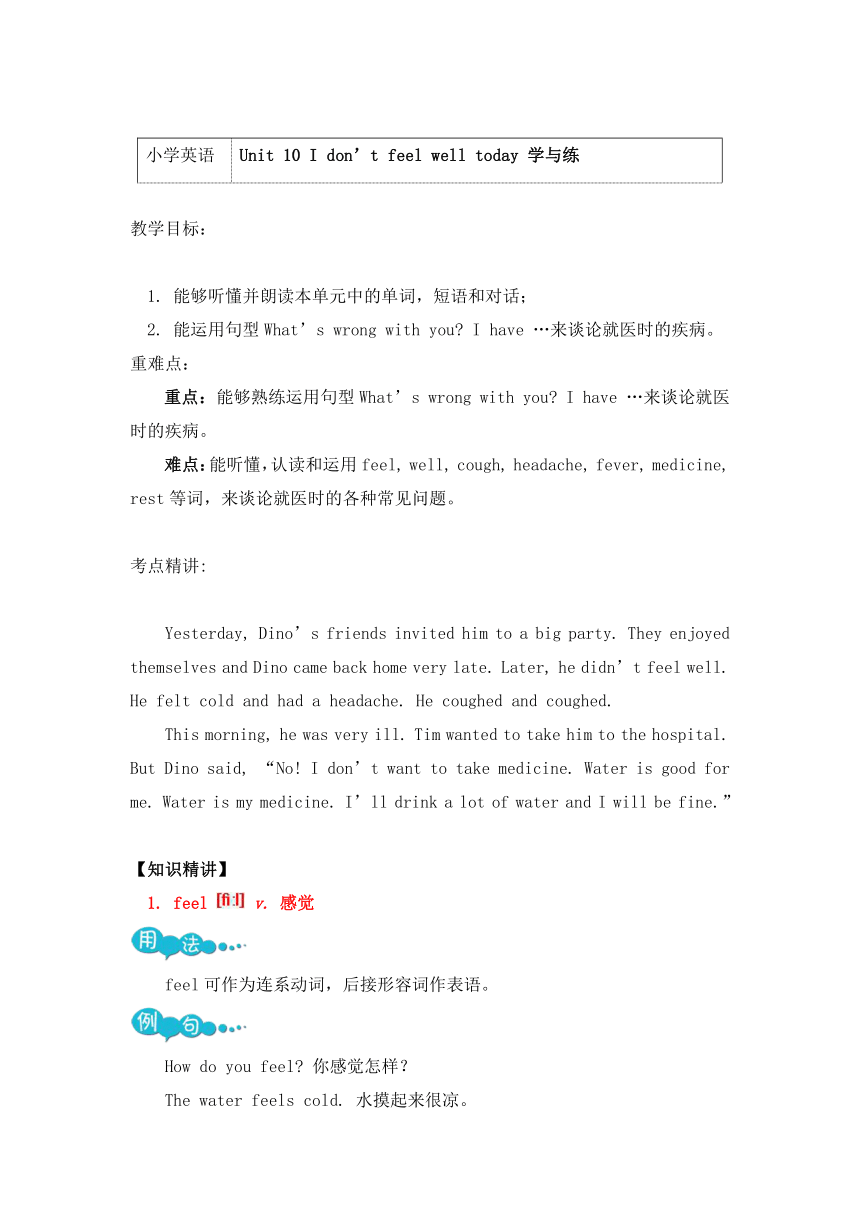
小学英语 Unit 10 I don’t feel well today 学与练 教学目标: 1. 能够听懂并朗读本单元中的单词,短语和对话; 2. 能运用句型What’s wrong with you I have …来谈论就医时的疾病。 重难点: 重点:能够熟练运用句型What’s wrong with you I have …来谈论就医时的疾病。 难点:能听懂,认读和运用feel, well, cough, headache, fever, medicine, rest等词,来谈论就医时的各种常见问题。 考点精讲: Yesterday, Dino’s friends invited him to a big party. They enjoyed themselves and Dino came back home very late. Later, he didn’t feel well. He felt cold and had a headache. He coughed and coughed. This morning, he was very ill. Tim wanted to take him to the hospital. But Dino said, “No! I don’t want to take medicine. Water is good for me. Water is my medicine. I’ll drink a lot of water and I will be fine.” 【知识精讲】 1. feel v. 感觉 feel可作为连系动词,后接形容词作表语。 How do you feel 你感觉怎样? The water feels cold. 水摸起来很凉。 feel v. 摸 Please feel the stone. 请摸一下这块石头。 (1) Today I felt very _____. A. happily B. happy C. sadly 答案:B 思路分析:句意为“今天我感到很高兴。”feel是连系动词,故后接形容词,选B项。 (2) 我摸了一下这个男孩的头。 I _____ the boy’s _____. 答案:felt; head 思路分析:根据汉语“摸了”可知表示过去,故用过去式felt;“头”用head表示。 2. well adj. (身体)好的 well作为“(身体)好的”讲时,是形容词。其比较级和最高级为:better, best。 I don’t feel well. 我感觉不舒服。 I’m very well. 我很好。 well adv. 好,常修饰动词。 You speak English very well. 你英语说得很好。 He writes well. 他写得好。 (1) —How are you —I’m _____, thank you. A. exciting B. well C. bad 答案:B 思路分析:根据答语的thank you可知前半句句意为“我很好”,故选B项。 (2) My sister is a _____student, and she sings _____. A. well; good B. good; good C. good; well 答案:C 思路分析:第一空处修饰名词student,故前用形容词good;后一空修饰动词sing,故用副词形式,选C项。 3. medicine n. 药 medicine常作不可数名词。常用短语为:take some medicine吃些药。 You should take some medicine and have a good sleep. 你应当吃些药并好好睡一觉。 —Doctor, what can I do —You can drink more water and take _____. A. medicine B. medicines C. a medicine 答案:A 思路分析:medicine为不可数名词,故没有复数形式,也不能用冠词a修饰,故选A项。 4. rest v. 休息 rest可作动词,意为“休息”,是不及物动词。 You can rest for a while. 你可以休息一会儿。 Where can I rest 我能在哪儿休息? rest还可作名词,意为“休息”,常用短语为:have a rest 休息。 Let’s have a rest. 让我们休息一下吧。 Tomorrow I will rest at home. (改为同义句) Tomorrow I will _____ _____ _____ at home. 答案:have a rest 思路分析:在原句中,rest是动词,意为“休息”;rest还可作名词,用于短语:have a rest相当于rest。 5. —What’s wrong with you 你怎么了? —I have a cough. 我患了咳嗽。 本交际用语是对病情的询问以及回答。 What’s wrong with sb. 意为“某人怎么了?” 答语常用:主语+have/has +疾病。其中have/has意为“患某种疾病”。 —What’s wrong with her 她怎么了? —She has a headache. 她头疼。 —What’s wrong _____ your brother —He _____ a bad cold. A. ... ...
~~ 您好,已阅读到文档的结尾了 ~~

